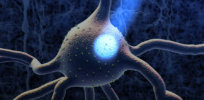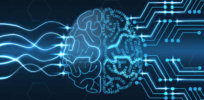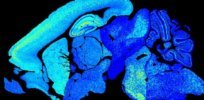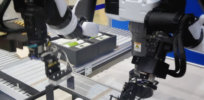Singularity Hub

How plastic-eating bacteria could help us make a dent in massive Pacific trash vortex
The Pacific trash vortex, is a massive collection of debris in the North Pacific Ocean, the main components are tiny ...

Moonshot genomics: How CRISPR is opening the door to reshaping life itself
It’s a moonshot idea. If the genome is a book, gene editing is like copy editing—changing a typo here and ...

Which came first, the chicken or the egg? In the near future, maybe neither
Which comes first, the chicken or the egg? This eternally-confounding question now has an answer—that is, if just the egg ...

Optogenetics: We may soon be able to manipulate the mind with light
Thanks to optogenetics, in just ten years we’ve been able to artificially incept memories in mice, decipher brain signals that lead to ...

Not quite total recall: How limits on what humans can remember is helping us ‘teach’ AI
An artificial neural network learns by adjusting synaptic weights—how strongly one artificial neuron connects to another—which in turn leads to ...

Meet the cyborg who can help decode the human brain
His motion capture suit, sensor-embedded gloves, and virtual reality eyewear were already enough to turn heads. But what stopped people ...

‘Swallowable surgeons’: Battalion of salt-crystal sized microbots in development that could revolutionize medicine
Drs. Marc Miskin, Itai Cohen, and Paul McEuen at Cornell University spearheaded a collaboration that tackled one of the most pressing ...

Venus shows signs of life. Here’s what it means
We have only had the briefest of glimpses of a barren landscape from the two Russian landers that made it down to ...

Could lab-grown sushi save rapidly declining fish populations?
[A]according to the Global Aquaculture Alliance, 3.1 billion people around the world now rely on fish and seafood for a ...

Nature has given us a blueprint for longevity. We just need to decode it
Our aging process extends for years, during which we experience a slew of age-related disorders. Diabetes. Heart disease. Dementia. Surprisingly, ...

Electroacupuncture: Promising pain therapy or quackery?
One idea [for alternative pain relief] is to specifically stimulate nerves that act as highway carriers of pain signals and ...

One year in, 9 boys with muscular dystrophy show remarkable progress from gene therapy
Nine boys aged 6 to 12 who have been living with [Duchenne Muscular Dystrophy] since birth received a gene therapy ...

Teaching AI to think ethically
[M]athematicians have developed a model that can help businesses spot when commercial AI systems might make shady choices in the ...

Concerned about ‘fake news’? It could get a lot worse with AI
Fake news has certainly become a widespread and insidious problem, and in a year when we’re dealing with both a ...

Unlocking the ‘deepest secrets of our brains as we grow and age’
Just as our human relationships and connections can nudge, push, or dramatically shift societal values and consequences, the connections between ...

Bioprinting human ears inside living mice—all without a single surgical cut
Tissue engineering just got wilder and weirder. Using nothing but light and bioink, scientists were able to directly print a ...

Platinum mesh device moves us closer to wearable or implantable artificial kidney
Kidneys clean our blood using nephrons, which are essentially filters that let fluid and waste products through while blocking blood ...

Monkey mind control? Ultrasound pulses influence decision making
A team of scientists was pulsing imperceptible ultrasound waves through his skull into frontal parts of his brain, and tacitly ...

Ultimate fitness hack: Imagine being able to build muscles with a gene therapy
Trying to hack fitness is a multi-million-dollar industry; we’ve all seen at least one ad featuring a purported miracle product ...

‘AI in archeology’ pinpointing new excavation sites at an ‘unimaginable’ pace
Archaeologists have uncovered scores of long-abandoned settlements along coastal Madagascar that reveal environmental connections to modern-day communities. They have detected ...

A different approach to finding alien life: What if ET breathes hydrogen instead of oxygen?
The first time we find evidence of life on a planet orbiting another star (an exoplanet), it is probably going ...

Smartphone DNA testing app offers ‘ultra-portable’ health and environmental monitoring tool
On-the-spot DNA tests could prove invaluable to doctors, farmers, and officials responsible for food safety or environmental monitoring. Now Chinese ...

‘Digital’ contact tracing: How would the US react to coronavirus containment effort that tracks our cell phones?
There’s a reason contact tracing has survived the test of time: it works. Thanks to epic efforts at hunting down ...

Synthetic biology amps up ‘decades-old’ vaccine technology
According to STAT, the Bill and Melinda Gates Foundation and the National Institute of Health (NIH) are betting on synthetic biology to ...

Coronavirus might push us towards a more automated society
There’s plenty of hope and opportunity to be found in this crisis. Peter Xing, a keynote speaker and writer on ...

Explaining consciousness: These 2 brain networks show how we turn experiences into memories
One of the most recent studies showed a clear relationship between two brain networks critical to consciousness. In a paper ...

Custom 3D printed bone implants could revolutionize reconstructive surgery
Become partially android for a couple of years while your body heals itself. It may sound far-fetched, but for patients ...

Plummeting prices for genetic sequencing open ‘Pandora’s box of ethical concerns’
The speed at which the price of genetic sequencing has fallen has been astonishing, from $50,000 a decade ago to roughly $600 today ...

